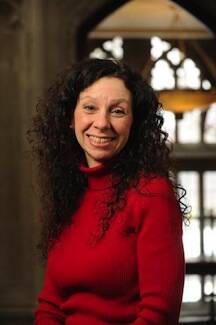Flannery O’Connor would be 90 years old on March 25 had she survived the disease that killed her slowly for 13 long years, leaving her dead at 39.
She grew up strange—an only child in a large extended family, a Catholic girl in the Protestant South, an unconventional student the convent school nuns didn’t like. (The feeling was mutual.)
She collected chickens for company—taught them tricks, sewed them clothes and kept a lookout for “freaks” who lacked a wing or an eye or, better yet, a head.
She learned to write fiction, honed her extravagant style and made her way to New York. She wrote, “Were it not for my mother, I could easily resolve not to see Georgia again.”
She boarded a southbound train for Christmas vacation, and when she arrived she resembled “a shriveled old woman.” Full-blown lupus had set in. She was home to stay.
She wrote for two hours every day for the rest of her life. On death’s door, she hid her manuscript under her pillow so the nurses wouldn’t take it away.
She died at the height of her powers, leaving behind 32 short stories, two novels, a dozen (plus) essays and hundreds of letters. All of this is genius, and she’d have written more had she not been brought to an abrupt and abiding halt by the mortal illness she lived with and died by.
Who knows what kind of life she might have led without it, without the pressure and the threat, without that sword of Damocles hung above her head each morning as she sat at her manual typewriter, pounding away, telling stories like her life depended on it?
Sickness made her bold.
She had to believe in herself. She didn’t have the luxury of doubt, of lying around and whining about her lack of a Guggenheim. She didn’t have time.
She was brilliant in the most ordinary ways. She told terrible stories about everyday life, stories people don’t want to hear—yet we read them hungrily, as if they contained news we need.
She used the speech of country people—the “folks” she lived with—shaped by limitation, yet somehow eloquent and elegant, full of grit and grace. They talked like poets and didn’t know it. But she surely did.
She was funny, always seeing the awkward angle of a thing—those thick glasses a joke, for her vision was keen—and she made us see it, too. We begin reading a story, put our Flannery goggles on, and suddenly the world is transformed—strange things seem normal and normal things odd. The drift and depth of the simplest thing—a bratty cat, a lady’s hat, a new tattoo—always comes as a shock, a truth we forgot we knew.
She lived deeply, felt powerfully, twigged and kenned and saw down into life. She told us things that surprised and sanctified, scarified and satisfied, all at the same time.
She gave us a vision and a vocabulary—taught “the terrible speed of mercy”—glimpsed a God of grace who measures and pours it out prodigally and in astonishing ways.
She looked in the mirror of her characters’ souls—saw her own slim virtues and her own broad flaws—and faithfully watched them fall and founder and, sometimes, rise.
She believed in our journey to the Father of Souls, in the dragon who sits by the side of the road, waiting to devour us.
She wrote, “No matter what form the dragon may take, it is of this mysterious passage past him, or into his jaws, that stories of any depth will always be concerned to tell.”
She also wrote this: “She would have been a good woman if it had been somebody there to shoot her every minute of her life.” In her most famous story, a murderer speaks this horrific-hilarious line with reference to his victim. But, like any piece of wisdom, it could apply to any of us, including the author of the story.
Flannery O’Connor was a good woman because there was someone there to shoot her every minute of her life—call it The Misfit, call it the dragon, call it lupus, call it death.
She wrote with a shotgun cocked and aimed at the bullseye of the heart, and she didn’t flinch.
She was no saint. She was like us—only brilliant and brave, full of stories that were true.
She was holy in a way she never knew. Like the rest of us—me and you.








